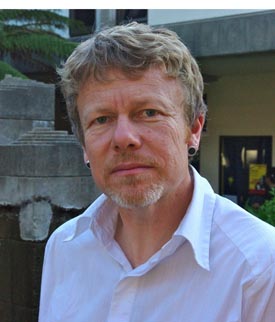Last fall, associate professor of film and digital media Peter Limbrick received the UCSC Arts Division's Excellence in Research Award for his new book Making Settler Cinemas.
In honor of this newly established award by arts dean David Yager, Limbrick will present a free public lecture to discuss his research on Monday, May 23, at 6 p.m. in the UCSC Communications Building, Studio C.
Limbrick’s book explores how colonialism helped shape the cinemas of three “settler” societies—the United States, Australia, and New Zealand.
Settler societies are those in which the colonizers never left, but instead displaced indigenous peoples, made the land their home, and developed their own national identities.
Limbrick argues that because of similar colonial relationships, the cinemas of all three countries are connected and have a great deal in common.
“In the period I looked at—the 1920s to 1950s—Australia and New Zealand were still trying to reckon with their own national identity, while American cinema was in the classical period—its heyday,” said Limbrick.
“But even in some of John Ford’s most famous Westerns, you can still see the throes of original imperial power and an uneasy sense of national identity.”
Limbrick noted that none of those films now look at all progressive in their depiction of indigenous peoples.
“Doing this historical work helps us get a fuller perspective on the colonial world,” he noted.
Limbrick looked at production relationships beyond the actual contents of the films—such as how the films were talked about in the press and what the actors said about them—and in one case collaborated with a film archive to re-exhibit an overlooked film from the 1950s.
He also studied home movies, scrapbooks, and business records to get a better sense of the context for the films and to discover what was involved in conceiving, planning, and making them.
“Instead of just writing them off as old films, we need to look at them more closely to understand them better,” said Limbrick.
“Sometimes films will reveal things about difficult historical encounters in ways that are quite unexpected.”
Peter Limbrick to deliver Arts Division Dean’s Research Lecture



